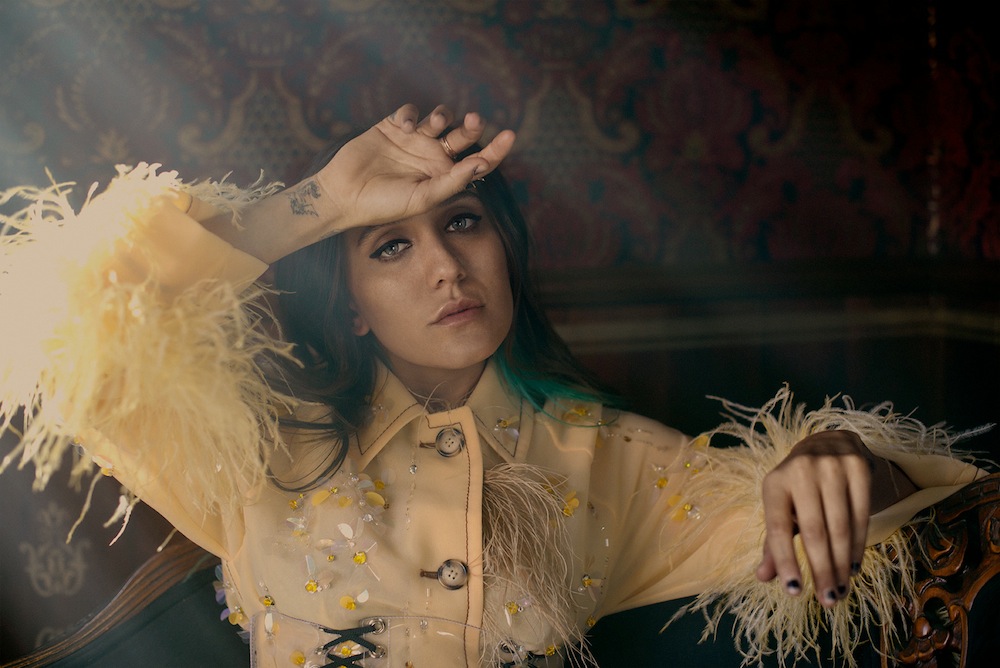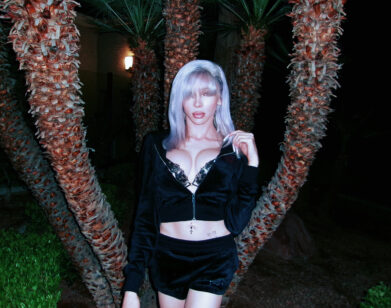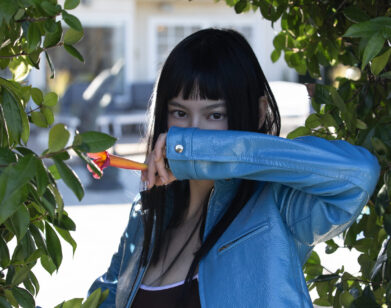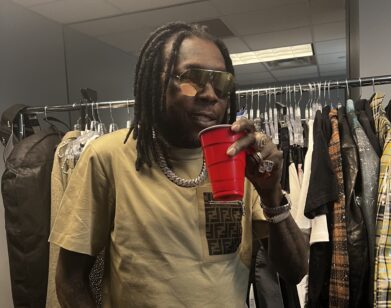Jesse Jo Stark
JESSE JO STARK AT NO VACANCY IN LOS ANGELES, MARCH 2017. PHOTOS: BRIAN HIGBEE. STYLING: DANI + EMMA. HAIR: AARON LIGHT FOR THE WALL GROUP USING ORIBE AND T3. MAKEUP: KATEY DENNO FOR THE WALL GROUP.
When Jesse Jo Stark was in high school, she took regular road trips from her native L.A. to San Francisco. Her soundtrack of choice? The Misfits, AFI, and the Circle Jerks (it was her punk phase). Stark can detail “stages” of musical upbringing, which was an eclectic one, thanks to her parents; in the late-‘80s they founded the fashion brand Chrome Hearts, which has been worn by many a musician, and Stark remains involved in the family business through designing. They introduced her to everything from country (Merle Haggard) to rock (Fleetwood Mac), and she rebelled with pop powerhouses like Christina Aguilera. Nowadays, Stark looks more to the former than the latter as she shapes her own sound. “I’m not trying to recreate anything completely from the past,” she explains, “but if I’m looking up some inspiration, it’d probably be Cher from the ’70s.”
The result is an alt rock sensibility and an emphasis on songwriting, which became a passion for Stark when she graduated from her aforementioned punk years around age 18. In January, she released her first single “Driftwood” and today, days before the month comes to a close, premieres her second, “April Flowers,” below. “I wrote it quite a bit ago,” she says. “It’s about love, but it’s also about the idea of having everyone else involved in that and everyone having an opinion of what it is, handling your relationship.” Produced by Jason Lytle (formerly of the band Grandaddy), whom she met through a mutual friend, and co-written by Isaac Carpenter, it’s an unhurried, reflective song with surreal lyrics like, “All the spooky little kids / That can creep under your lids / With their Barbie Doll brains.”
Interview recently spoke to the 26-year-old, who plans to release two songs this summer with a full-length album to follow come September, by phone while she was at home in L.A.
HALEY WEISS: Has your perspective on your music changed at all? What do you think of these songs now that you’re a year out from writing them?
JESSE JO STARK: It’s all a development—I write and I go in and I record it, and then I mix it—so it’s building it into what it is now. It’s kind of a beautiful process, it’s not tiring and I don’t get tired of the songs, surprisingly. So it hasn’t really changed much, I’m still [working] on the body of work I’m releasing right now.
WEISS: You worked with Jonathan Rice on some of these new songs, or is it the whole album?
STARK: No, just some of them. I think it was six songs together.
WEISS: What do you value most in a producer or collaborator?
STARK: They’re going to challenge you, but also allow you to not be stuck in a corner, and accept the weirdness factor a little bit. I think it’s a vibe: when I meet someone, I can tell if we’re going to be able to spend intimate time together for a long time, and vice versa. With Jonathan, he’s a friend of mine, and we had a relationship over time and then sat down to write together and decided to go into the studio, so that was a really slow relationship; our relationship grew and I was able to create with him. Jason [Lytle], who I worked on “April Flowers” with, we really hit it off. He was able to pull a lot out of me; he dug deep with me, so it was cool to work with him.
WEISS: Is that a difficult thing to do? Meeting someone, when they’re not a friend first, and diving right into that personal, creative process?
STARK: I think it is challenging. Over time, it becomes a little less challenging, but it’s a really intimate thing. I call them blind dates: you go into this room with someone, and it’s hard to put yourself out there, but it’s what you’ve got to do in this world. It’s challenging but it’s cool, for me at least, because I’m really introverted and it allows me to grow as a person when I get to be put in a room with different people.
WEISS: How would you describe your writing process? Would you consider it autobiographical, methodical, are you writing from the point of view of characters?
STARK: I do write from points of view. But I really do love writing about love, and it’s from personal experiences, I think with a dramatic touch on it. I enjoy writing about the darker side of love and putting beautiful tones to it, so it’s not completely dreary. Most of my writing is about a lot of me, but I’ve definitely written with another viewpoint in mind.
WEISS: Do you write anything in addition to lyrics or is it exclusively songs? Do you write poems or fiction?
STARK: I’ve written short stories, and I started with poetry; when I was younger I would write poems, and it slowly developed. Then I realized I actually enjoyed writing, and I started to write songs.
WEISS: And your first song you wrote at age 12, right?
STARK: Yeah, I think I was younger than that. It was really short, but it was called “My Heart’s on Fire.”
WEISS: Do you recall any of the lyrics or what spurred you to write it?
STARK: I think I was pissed off at this boy in school, who was probably my first crush. The lyrics were pretty intense for being so young and feeling that way.
WEISS: When you wrote that, were you also singing songs publicly, or just writing them?
STARK: I was little, so I was just singing them in class and trying out different instruments—that kind of stuff.
WEISS: Were you equally interested in learning to play instruments as you were singing?
STARK: I was when I was younger. I did guitar lessons three days a week, but when I turned 18 I was really intrigued by writing. I wanted to write a lot more.
WEISS: When did you first decide to share your music in a more serious way and pursue it professionally?
STARK: I would say 18.
WEISS: What made you make that decision?
STARK: I’m very shy, and I think I was just ready to put stuff out there in that way. I’ve always done videos and I’ve always done performances here and there, but it wasn’t until I was 18 that I started actually wanting to book shows. You get to a point in your career where you’re ready, but I always wanted to do it. I knew what I wanted to do, not exactly what path I wanted to take, but I always wanted to be playing.
WEISS: If you’re on the shy side, how do you get past that to go on stage? I can’t imagine doing that.
STARK: It’s really crazy, but I think you just do it. I don’t know how anyone does it.
WEISS: Have you learned to enjoy it? You’ve been able to get to a comfortable place?
STARK: Yeah, 100 percent. I truly enjoy it. I don’t think the same fears come into your head. It’s just about getting the first foot onto the stage.
WEISS: I read that you grew up with an eclectic range of music. Who were the artists that your parents played while you were growing up? Do you come from a family that’s passionate about music?
STARK: I was raised on a lot of the Clash and a lot of country, and I think one of my first concerts was Motley Crue or Cher. I guess I was always immersed in it. At the time, I didn’t really like to admit that I liked what my dad was playing; I wanted to listen to Britney Spears—which I still love. [laughs]
WEISS: I feel like everyone has that experience with their parents.
STARK: For sure, and I can’t help but want to put on [those] songs [now]. Some of my friends are into it, but some of them would rather listen to rap, and that’s just not my vibe.
WEISS: In the artists that you admire most or listen to most, do you find that there’s a particular quality you’d like to emulate or that you really value?
STARK: I think that they’re—I feel like it’s everlasting. It’s not a fad. It’s not a trend. They kind of carry the same feeling; the first time you listen, 10 years later, they hold this feeling, and I have a respect for that.
WEISS: It’s hard to avoid trends, in a way. How do you determine what that everlasting quality is? Is that in the lyrics?
STARK: I think it’s in the lyrics. I could treat it like clothes: there are pieces that you always go back to, that your mom wore, that you’re then wearing again. I know everything is a cycle, but it definitely has to do with the lyrics, and country, for me, I feel like it’s so poetic. But then again Fleetwood Mac isn’t necessarily country—they do such a good job of that too. I don’t know what it is. I can’t say that my song isn’t trendy. But I do think we’re in a really different time for music, and I feel a lot more inspired by things that have been created a long time ago.
WEISS: You mentioned clothing, and I know you come from a creative household—your parents started Chrome Hearts—and you have an interest in fashion as well. Do you see your interest in fashion and music as totally separate entities, or do you see a crossover?
STARK: It helps to wear something that I feel good in when I play. I do think there’s a crossover; they’re all a way of making you, you, and you stick out. I want to feel good when I play, and I put on whatever makes me feel that I can carry the song I’m playing. I think everything connects, everything’s a way of communicating what you vibe is.
WEISS: You started a label, Sugar Jones Music, when you started releasing music. What was the impetus behind that? Are you looking to sign other artists?
STARK: I’ve actually not thought about that. Probably not, but you never know.
WEISS: Why is it important for you to release under your own label?
STARK: It was just the move for me, and I didn’t want to be held back because of my position. I have songs that I want to put out there and play, and I think it was the right move for me right now to self-release.
WEISS: Now that you’re nearly done with this collection of songs, and you’re releasing it piece by piece, how do you feel about it as your first complete body of work?
STARK: I’m nervous, but I’m happy, and I feel like I’m in a good place with the songs that I’ve chosen to release right now and I’m proud of them. It’s been a while since I’ve put out music, and I feel really stoked about it. I’m playing a show tonight and on Monday, and that’s the cool thing, being able to finish it and play it and see people’s reactions, and to be proud of something you put out. So I feel good. It’s always nerve-wracking putting things out for judgment, but I’m pretty proud of what I’m putting out right now.
WEISS: Is there one reaction in particular, that say a fan or family member has had to one of your songs, that surprised you or has stuck with you?
STARK: I’ve played a lot of rock, and the last two tracks—the track I put out and the new track I’m putting out—they feel more mature to people. It’s been interesting to see my family react and give me really good feedback. The cool thing about them is they won’t lie to me; I was kind of shocked by their response and it was a good one.
WEISS: Once you finished making this music, who was the first person you wanted to hear it?
STARK: Jonathan, who I wrote with, has been a big inspiration, so I play a lot of my stuff for him, but also my boyfriend. He’s kind of brutal, so if he doesn’t like it he’ll tell me and we’ll have a little fight about it, but it’s always nice to hear the negative, too, and not just have a pat on the back. I like to know the truth.
FOR MORE ON JESSE JO STARK, VISIT HER WEBSITE.







